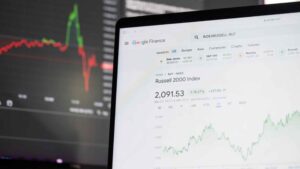The European Central Bank has cut rates by 25 basis points to 2.65% on Friday, marking its sixth consecutive cut since June 2024. The decision was made due to ongoing efforts to stimulate Europe’s weak growth, ongoing disinflation process and tariff threats from the US. ⁽¹⁾
Economic Data and Outlook
The ECB has downgraded the Eurozone’s growth for 2025 to 0.9% from its previous estimate of 1.1%, indicating slow economic expansion after experiencing weak growth in Q4 2024 of 0.1%. ⁽²⁾
The Eurozone manufacturing sector remains in contraction as recent data came out at 47.6 in February 2025, up from January’s 46.6 PMI which indicates a slower contraction. The services sector meanwhile remains in expansion territory at 50.6 but has been slowly trending downwards. ⁽³⁾
Inflation remains an important factor in the ECB’s policy trajectory. While inflation is easing, the central bank forecasts inflation at an average of 2.3% in 2025, then expected to decline to 1.9% in 2026, gradually approaching its 2% goal. ⁽⁴⁾
Tariffs Impact and Geopolitical Tensions
The ECB has taken into mind that the threat of US tariffs on Europe, especially 25% tariffs on automobiles, could impact the Eurozone’s economy by weakening its exports and economic growth.
In response to the tariff threats, European companies are proactively developing contingency plans to reduce economic disruptions.
Sectors such as auto manufacturers and consumer goods are particularly vulnerable. European leaders have vowed a firm response, with EU chief Ursula von der Leyen describing the tariffs as unjustified and pledging firm and proportionate countermeasures.
The EU is prepared to defend its economy by imposing retaliatory tariffs on US exports, targeting goods such as technology and agriculture, which could lead to an escalation in trade tensions. ⁽⁵⁾
Market Reactions and Outlook
The Euro strengthened against major currencies, rising 0.5% during the event. Traders and investors also speculate that the ECB could stop its rate cycle sooner if economic data improves.
European stocks reacted positively following the rate cut, reflecting investor optimism about the ECB’s supportive measures for the economy. ⁽⁶⁾
The ECB is expected to stay on the dovish side until the data shows improvement in the Eurozone economy. The ECB also stated that geopolitical risks, including tensions with the US, remain a concern. The potential for tariffs on European exports could therefore complicate the ECB’s monetary policy goals. ⁽⁷⁾


